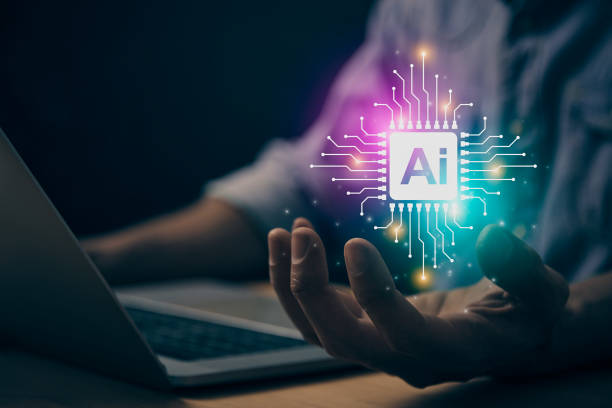### What is Artificial Intelligence and How Does it Work?
[Image of hi-tech digital technology futuristic circuit digital]
In short, Artificial Intelligence (AI) is the ability of a machine or computer system to perform tasks that typically require human intelligence. These tasks include learning, reasoning, problem-solving, understanding natural language, pattern recognition, and decision-making. AI is essentially an attempt to simulate human thinking and learning processes in machines.
AI is broadly divided into two categories: Narrow AI (or Weak AI) and General AI (or Strong AI). Narrow AI is designed to perform specific tasks and excels in that area but cannot generalize to other areas. Examples of Narrow AI include facial recognition systems, voice assistants, and search engines. In contrast, General AI refers to a system that can perform any task that a human can, with the same level of efficiency. General AI is still under development and has not yet been fully realized.
**Main components of AI systems:**
* Machine Learning
* Artificial Neural Networks
* Natural Language Processing
* Computer Vision
AI uses complex algorithms and mathematical models to analyze data and identify patterns within them. These patterns help the system make decisions, make predictions, and generally exhibit intelligent behavior. The learning process in AI typically occurs in three ways: supervised learning, unsupervised learning, and reinforcement learning.
>Are you worried that your company’s old website is scaring away new customers? Rasaweb solves this problem with a modern and efficient corporate website design.
>✅ Increases your brand credibility.
>✅ Helps attract targeted customers.
>⚡ Contact Rasaweb for a free consultation!
### Wide Applications of Artificial Intelligence in Various Industries
[Image of geometric blue digital background for cyberspace and tech]
The applications of AI are increasing daily and affect almost all industries. In the medical field, AI is used for disease diagnosis, drug development, and providing personalized healthcare. In the automotive industry, AI plays a key role in the development of self-driving cars. In the financial field, AI is used for fraud detection, risk management, and providing financial advisory services.
**Some important applications of AI in various industries:**
* **Healthcare:** Disease diagnosis, drug development, personalized healthcare
* **Automotive:** Self-driving cars, driver assistance systems
* **Finance:** Fraud detection, risk management, financial consulting
* **Manufacturing:** Automation, quality control, failure prediction
* **Retail:** Personalizing customer experience, demand forecasting, supply chain management
* **Education:** Personalized learning, automated assessment, virtual learning assistants
In the manufacturing industry, AI is used for process automation, quality control, and equipment failure prediction. In the retail sector, AI helps businesses personalize customer experiences, predict demand, and optimize their supply chains. In the education sector, AI can be used to provide personalized learning, automated assessment, and the development of virtual learning assistants. AI, as a powerful tool, has the potential to reshape industries and improve human lives.
### Advantages of Using Artificial Intelligence
[Image of creative AI logo in computer microchip design over abstract]
The use of AI has numerous benefits for businesses and society in general. One of the most significant benefits is increased productivity and reduced costs. AI can automate many repetitive and time-consuming tasks, leading to savings in time and resources. AI can also increase the accuracy and quality of work, as intelligent systems are less prone to errors than humans.
**Key Benefits of Using Artificial Intelligence:**
* **Increased Productivity:** Automation of repetitive tasks, reduced task completion time
* **Reduced Costs:** Savings in time and resources, reduced human error
* **Improved Decision-Making:** Data analysis, pattern identification, provision of suggestions
* **Enhanced Customer Experience:** Personalization of services, provision of 24/7 support
* **Innovation Development:** Discovery of new solutions, improvement of products and services
In addition, AI can help improve decision-making. Intelligent systems can provide valuable information to managers and decision-makers by analyzing data and identifying patterns. AI can also enhance the customer experience. Using AI, businesses can personalize their services, provide 24/7 support, and quickly respond to customer needs. Finally, AI can help develop innovation. Using AI, new solutions can be found for various problems, and products and services can be improved.
“`html
| Advantage | Description |
|---|---|
| Increased Productivity | Task automation, reduced task completion time |
| Reduced Costs | Savings in time and resources |
| Improved Decision Making | Data analysis, pattern identification |
“`
### Challenges Facing Artificial Intelligence
[Image of futuristic digital AI hand holding AI microchip with circuit]
Despite its numerous advantages, the development and use of AI are also associated with several challenges. One of the most significant challenges is ethical and privacy issues. The use of AI can lead to discrimination, privacy violations, and misuse of data. Therefore, it is necessary to develop laws and regulations to control and regulate the use of AI.
Click here to preview your posts with PRO themes ››
**Main challenges in the field of Artificial Intelligence:**
* **Ethical and Privacy Issues:** Discrimination, privacy violations, data misuse
* **Security:** Vulnerability to cyberattacks, data manipulation
* **Transparency and Interpretability:** Difficulty in understanding how intelligent systems make decisions
* **Accountability:** Determining responsibility in case of errors or damages
* **Employment:** Replacing human labor with machines
Another challenge is the issue of security. AI systems can be vulnerable to cyberattacks, and their data can be manipulated. Therefore, appropriate security measures must be taken to protect AI systems. Another challenge is the issue of transparency and interpretability. Understanding how intelligent systems make decisions can be difficult, especially in the case of deep neural networks. This issue can reduce trust in intelligent systems. Also, the issue of accountability is a significant challenge. In the event of an error or damage caused by the performance of an AI system, determining responsibility is difficult. Finally, one of the main concerns about AI is the issue of employment. Some people are worried that AI will lead to the replacement of human labor with machines and cause increased unemployment.
>Are you dissatisfied with the low sales of your online store?
>Rasaweb is your solution to having a professional and high-selling online store.
>✅ Significant increase in sales and revenue
>✅ Easy and enjoyable shopping experience for customers
>⚡ Get a free consultation from Rasaweb right now!
### Machine Learning and Its Role in Artificial Intelligence
[Image of hands coding on laptop with AI brain circuit icon and HTML]
Machine Learning is one of the main sub-branches of AI that allows systems to learn from data and improve their performance without explicit programming. In other words, machine learning gives machines the ability to increase their knowledge with experience and make better decisions.
**Main Types of Machine Learning:**
* **Supervised Learning:** The system is trained using labeled data.
* **Unsupervised Learning:** The system discovers patterns using unlabeled data.
* **Reinforcement Learning:** The system learns how to act in the best way by trial and error.
Supervised learning is one of the most common methods of machine learning. In this method, the system is trained using labeled data. For example, to train an image recognition system, you can use a set of labeled images (e.g., images of cats and dogs). Unsupervised learning is used in cases where labeled data is not available. In this method, the system discovers patterns using unlabeled data. For example, unsupervised learning can be used to segment customers based on their behavioral patterns. Reinforcement learning is used in cases where the system needs to make decisions in a dynamic environment. In this method, the system learns how to act in the best way by trial and error. For example, reinforcement learning can be used to train a robot to play a video game.
### What Will the Future of Artificial Intelligence Be Like?
[Image of futuristic round banner with computer circuit artificial intelligence]
The future of AI looks very bright and promising. With increasing advances in hardware and software, AI is expected to play a much more important role in our lives in the future. In the future, we will see a wider use of AI in various fields, including:
* **Healthcare:** More accurate and faster diagnosis of diseases, providing personalized treatments, developing new drugs
* **Transportation:** Self-driving cars, intelligent traffic management systems, optimized public transportation
* **Education:** Personalized learning, automated assessment, virtual learning assistants
* **Manufacturing:** Full automation of processes, precise quality control, equipment failure prediction
* **Customer Service:** 24/7 support, quick answers to questions, providing personalized suggestions
Also, AI is expected to help us solve complex problems and global challenges. For example, AI can help us combat climate change, develop sustainable energy sources, and improve food security. However, it is necessary to pay attention to the ethical and social challenges arising from the development of AI and take measures to reduce potential risks. For example, it is necessary to develop laws and regulations to control and regulate the use of AI and provide training to prepare the human workforce for the changes resulting from AI. AI has a big future.
### Artificial Intelligence and Its Impact on the Labor Market
[Image of ETF exchange-traded fund stock market trading investment fin]
Artificial intelligence (AI) is rapidly changing the landscape of the labor market, automating and streamlining some jobs while completely replacing others. This transformation creates both opportunities and challenges for the workforce.
**Positive Impacts of AI on the Labor Market:**
* **Creating New Jobs:** AI helps create new jobs in the areas of development, implementation, maintenance, and training of AI systems.
* **Increasing Productivity:** AI can automate repetitive and tedious tasks, allowing employees to focus on more creative and strategic work.
* **Improving Working Conditions:** AI can help reduce risks and improve safety in hazardous work environments.
* **Access to More Job Opportunities:** AI can increase job opportunities for people with disabilities and those living in remote areas.
Click here to preview your posts with PRO themes ››
**Negative Impacts of AI on the Labor Market:**
* **Job Displacement:** AI can completely replace some jobs, especially those involving repetitive and predictable tasks.
* **Need for New Skills:** AI requires new skills that many employees lack. This can lead to unemployment and inequality.
* **Ethical Concerns:** The use of AI in hiring and performance evaluation can raise ethical concerns, particularly regarding discrimination and privacy.
To address the challenges posed by AI, appropriate training needs to be provided to prepare the human workforce. This training should include the technical skills needed to work with AI systems as well as soft skills such as critical thinking, problem-solving, and creativity.
“`html
| Impact | Description |
|---|---|
| Creating New Jobs | Development, implementation, maintenance |
| Increasing Productivity | Automation of repetitive tasks |
| Job Displacement | Repetitive and predictable tasks |
“`
### Ethics in Artificial Intelligence: Importance and Challenges
[Image of hi-tech digital technology futuristic circuit digital]
With the increasing use of artificial intelligence (AI) in various fields, ethical issues related to this technology are becoming more important. The decisions and performance of AI systems can have a profound impact on people’s lives and society, so these systems must be designed and used in a way that respects ethical values.
**Ethical Challenges in Artificial Intelligence:**
* **Discrimination:** AI systems can be unintentionally discriminatory, especially if their training data contains biases.
* **Privacy:** The use of personal data to train and operate AI systems can raise privacy concerns.
* **Accountability:** In the event of an error or damage caused by AI systems, determining responsibility is difficult.
* **Transparency:** How AI systems make decisions can be opaque and incomprehensible.
* **Control:** With the advancement of AI, there are concerns about controlling this technology and preventing its misuse.
To address these challenges, ethical principles must be observed in the design, development, and use of AI systems. These principles should include fairness, transparency, accountability, privacy, and respect for human rights. Also, laws and regulations need to be developed to regulate the use of AI, and training needs to be provided to raise public awareness of the ethical issues associated with this technology. Ethics in AI are very important.
>Did you know that 94% of a user’s first impression of a business is related to its website design? With professional corporate website design by **Rasaweb**, turn that first impression into an opportunity for growth.
>
>✅ Attract more customers and increase sales
>✅ Create credibility and trust in the eyes of the audience
>
>⚡ Get a free website design consultation!
### Artificial Intelligence Development Tools: Introduction and Review
[Image of human hand holding AI processor chip of cube technology arti]
The development of artificial intelligence (AI) requires various tools and frameworks that help developers create, train, and deploy models. These tools offer a range of capabilities, from data management and machine learning to natural language processing and computer vision.
**Some Popular Artificial Intelligence Development Tools:**
* **TensorFlow:** An open-source machine learning framework developed by Google that is used for a wide range of applications, including image recognition, natural language processing, and reinforcement learning.
* **PyTorch:** Another open-source machine learning framework that is known for its flexibility and ease of use. PyTorch is often used for research and development.
* **Keras:** A high-level API for building neural networks that can run on TensorFlow, Theano, or CNTK. Keras is ideal for beginners and those who want to quickly build prototypes.
* **Scikit-learn:** An open-source machine learning library that includes various algorithms for classification, regression, clustering, and dimensionality reduction. Scikit-learn is suitable for traditional machine learning tasks.
* **IBM Watson:** A cloud-based AI platform that offers a range of services, including natural language processing, computer vision, and machine learning. IBM Watson is suitable for building large-scale intelligent applications.
In addition to these tools, cloud platforms such as Amazon Web Services (AWS), Microsoft Azure, and Google Cloud Platform also offer various services for AI development. These services include virtual machines with GPUs, data management tools, and AI APIs.
Choosing the right tool for AI development depends on the specific needs and requirements of the project. Factors such as data type, model complexity, and available resources should be considered. However, the tools mentioned above are a good starting point for anyone interested in entering the world of AI development.
### Key Concepts in Artificial Intelligence: A Comprehensive Overview
Click here to preview your posts with PRO themes ››
[Image of hands typing on laptop with AI interface and hologram graphi]
Artificial intelligence (AI) is a broad and complex field that encompasses various concepts and techniques. Understanding these key concepts is essential for anyone interested in learning and working in the field of AI.
**Key Concepts in Artificial Intelligence:**
* **Machine Learning:** A subset of AI that allows systems to learn from data and improve their performance without explicit programming.
* **Neural Networks:** Computational models inspired by the structure of the human brain that are used to learn patterns from data.
* **Deep Learning:** A type of machine learning that uses deep neural networks (neural networks with many layers) to learn complex patterns from data.
* **Natural Language Processing:** A field of AI that enables computers to understand and process human language.
* **Computer Vision:** A field of AI that enables computers to understand images and videos.
* **Robotics:** A field of engineering that deals with the design, construction, operation, and application of robots.
* **Expert Systems:** Computer programs that use the knowledge and skills of human experts to solve problems.
These are just some of the key concepts in AI. However, understanding these concepts will help you gain a deeper understanding of this field and be able to operate more effectively in it. AI Key Concepts is important.
#### Frequently Asked Questions
| Question | Answer |
| :————————————————————————— | :—————————————————————————————————————————————————————— |
| What is the definition of Artificial Intelligence (AI)? | It is a field in computer science aimed at creating intelligent machines that can think, learn, solve problems, and make decisions like humans. |
| Mention some common applications of AI. | Includes self-driving cars, voice assistants (like Siri and Alexa), recommendation systems (like Netflix and Amazon), facial recognition, and medical diagnosis. |
| What is the difference between Narrow AI (ANI) and General AI (AGI)? | Narrow AI specializes in one specific task, while General AI possesses human intellectual ability to perform any cognitive task. |
| What is Machine Learning and its relationship to AI? | Machine Learning is a branch of AI that focuses on developing algorithms that allow systems to learn from data without explicit programming. |
| What are Artificial Neural Networks? | They are computational models inspired by the structure and function of the human brain, used in deep learning to process data and discover complex patterns. |
| Mention some ethical challenges related to AI. | Includes issues of privacy, bias in data and algorithms, job loss, and responsibility in case of errors or unfair decisions. |
| What is Natural Language Processing (NLP)? | It is a branch of AI that focuses on enabling computers to understand, interpret, and generate human language in a useful and interactive way. |
| How can AI affect the job market? | It can lead to the automation of some routine tasks, requiring workers to be retrained and creating new jobs in the fields of design, development, and maintenance of AI systems. |
| What is Computer Vision? | It is a field in AI that enables computers to “see,” understand, and interpret images and videos in the same way humans do, enabling them to recognize objects and faces. |
| What is the importance of data in developing AI systems? | Data is the fuel that powers AI systems, especially in Machine Learning. The quality and quantity of data greatly affect the accuracy and performance of models and their ability to learn and make the right decisions. |
**And other services of Rasa Web Advertising Agency in the field of advertising**
Intelligent UI/UX: An exclusive service for increasing sales growth based on the use of real data.
Intelligent Website Development: An effective tool for user interaction through intelligent data analysis.
Intelligent UI/UX: A combination of creativity and technology to improve SEO ranking through custom programming.
Intelligent Google Ads: An effective tool for attracting customers through Google Ads management.
Intelligent Conversion Rate Optimization: A fast and efficient solution for online growth with a focus on Google Ads management.
And more than hundreds of other services in the field of internet advertising, advertising consulting, and organizational solutions
Internet Advertising | Advertising Strategy | Advertorials
**Resources:**
[Artificial Intelligence: Benefits, Challenges, and Future](https://virgool.io/@mostafa.sharif/artificial-intelligence-benefits-challenges-future-of-artificial-intelligence-p0ryp0o771u1)
[A Review of the Applications and Challenges of Artificial Intelligence in Today’s Life](https://www.ertebatresaneh.com/news/17918/%D8%A8%D8%B1%D8%B1%D8%B3%DB%8C-%DA%A9%D8%A7%D8%B1%D8%A8%D8%B1%D8%AF%D9%87%D8%A7-%D9%88-%DA%86%D8%A7%D9%84%D8%B4-%D9%87%D8%A7%DB%8C-%D9%87%D9%88%D8%B4-%D9%85%D8%B5%D9%86%D9%88%D8%B9%DB%8C-%D8%AF%D8%B1-%D8%B2%D9%86%D8%AF%DA%AF%DB%8C-%D8%A7%D9%85%D8%B1%D9%88%D8%B2)
[What are the Applications of Artificial Intelligence in the Tourism Industry?](https://faraso.news/News/50506/%DA%A9%D8%A7%D8%B1%D8%A8%D8%B1%D8%AF%D9%87%D8%A7%DB%8C-%D9%87%D9%88%D8%B4-%D9%85%D8%B5%D9%86%D9%88%D8%B9%DB%8C-%D8%AF%D8%B1-%D8%B5%D9%86%D8%B9%D8%AA-%DA%AF%D8%B1%D8%AF%D8%B4%DA%AF%D8%B1%DB%8C-%DA%86%DB%8C%D8%B3%D8%AA%D8%9F)
[What is Artificial Intelligence?](https://techrato.com/blog/%D9%87%D9%88%D8%B4-%D9%85%D8%B5%D9%86%D9%88%D8%B9%DB%8C-%DA%86%DB%8C%D8%B3%D8%AA)
Are you ready to transform your business in the digital space? Rasaweb Digital Marketing Agency, with its innovative and comprehensive solutions including professional SEO, strategic social media management, and [responsive website design](https://share.google/mQBI2uMQ2UUYhTmkx), paves the way for your success.
📍 Tehran, Mirdamad Street, next to Central Bank, South Kazerun Alley, Ramin Alley No. 6
✉️ [info@idiads.com](mailto:info@idiads.com)
📱 [09124438174](tel:+989124438174)
📱 [09390858526](tel:+989390858526)
📞 [02126406207](tel:+982126406207)





